A software engineer purchased the website OGOpenAI.com and redirected it to DeepSeek, a Chinese AI lab that has recently become a hot topic in the open source AI world.
Software engineer Ananai Arora told TechCrunch he bought the domain name for “less than a Chipotle meal” and plans to sell it for more.
This move was a clear nod to the way DeepSeek releases cutting-edge open AI models, much like OpenAI did in its early days. DeepSeek’s models, like older OpenAI models such as Point-E and Jukebox, can be used offline and for free by developers with the necessary hardware.
DeepSeek released an open version of its DeepSeek-R1 model last week, which caught the attention of AI enthusiasts. The company claims that this model performs better than OpenAI’s o1 on certain benchmarks. Outside of models like Whisper, OpenAI has rarely released its flagship AI in an “open” format lately, drawing criticism from some in the AI industry. In fact, OpenAI’s reluctance to release its most powerful model is cited in Elon Musk’s lawsuit, which claims the startup is not true to its original nonprofit mission.
Arora said he was inspired by a now-deleted post on X by Perplexity CEO Aravind Srinivas that compared DeepSeek to OpenAI from a more “open” era. “I thought it would be cool to publish my domain to DeepSeek for fun,” Arora told TechCrunch via DM.
DeepSeek joins Alibaba’s Qwen in the list of Chinese AI labs releasing open alternatives to OpenAI’s models.
The US government has been trying to rein in China’s AI labs for years with chip export restrictions, but if the latest AI models coming out of the country are any indication, more steps will be needed. Maybe.

